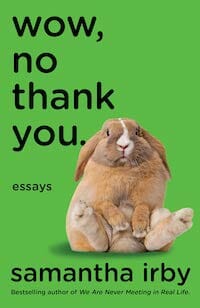Samantha Irby’s New Book Draws Us Into Her Hilarious, Gross World

Personal essays like the ones Samantha Irby writes have a clear purpose: to inform the reader, in great detail, about the author’s inner life. The genre lives or dies based on what’s happening in those inner lives. Fortunately, as much as Irby’s circumstances have changed since her breakout book Meaty, getting married and moving to Kalamazoo hasn’t changed the voice which broke out of blogging to become one of our funniest essayists.
To read Wow, No Thank You is to continue learning more about Irby’s bodily issues and personal hygiene choices (some of which, in this new era of Extreme Hand Washing, read like a time capsule from a hundred years ago). But her writing is a master class in self-deprecation and occasional imposter syndrome, even when chronicling her greatest successes, both personal (settling into what sounds like a pretty happy marriage with the frequently mentioned “my lady”) and professional (becoming a published author and a staff writer for the Hulu series Shrill).
 This can be a bit frustrating at times, like listening to a friend talk about what she could be doing—but isn’t—to turn her life around. But for those of us who’ve been there—”well, yeah, I could spend more time cleaning my apartment, but….”—her thoughts on balance prove more refreshing.
This can be a bit frustrating at times, like listening to a friend talk about what she could be doing—but isn’t—to turn her life around. But for those of us who’ve been there—”well, yeah, I could spend more time cleaning my apartment, but….”—her thoughts on balance prove more refreshing.
The specificity Irby brings into her work is sometimes staggering. A chapter in which she crafts her ultimate ‘90s music mixtape features artists familiar to teens growing up in that decade, including Liz Phair, Smashing Pumpkins and Ginuwine, but her exact picks make it possible to pinpoint her birthdate to a matter of months. As someone just a couple of years younger than Irby, her references reminded me of my sophomore year in high school, when all my friends were drama club seniors and the music they talked about seemed so cool. Hopefully, someone is using their quarantine time right now to make a Spotify playlist of her picks.
Some chapters sprawl beyond their subject matter more than expected, such as an essay on Irby’s experience trying to develop Meaty as a TV series with Abbi Jacobson which failed to be made. (Much like West’s recent sequel to Shrill, The Witches Are Coming, it seems that female memoirists approached by Hollywood about adapting their debut books are now required, in the follow-up, to write a chapter describing that process in all of its absurdity.) However, the chapters that do find real focus—such as a very long explanation as to a) why she does not enjoy leaving her house and b) if she does leave her house, why she will not be enjoying Girls Night—snap with precision and deliver countless grins and laughs.
Perhaps the most graphic sequence of the book features Irby describing her endometrial ablation, since which she has not had a period. Theoretically, sensitive readers have already bowed out of that section after she describes waking up in a hotel room one morning “in a congealed pool of blood so deep you’d need galoshes to wade through it” (though that moment is followed by helpful advice about what to do in that scenario, which is much appreciated). But her attitude towards taking this step to improve both her physical and mental health brings with it a sense of enviable power, a feeling of taking control over a situation that has been tormenting her.
The most inspiring thing about Irby’s tales? The fact that she so fully owns her flaws, seems fearless about revealing her insecurities, that they stop being insecurities. A chapter entitled “Lesbian Bed Death” is perhaps the most dreamy and romantic of the bunch, despite a title seemingly rooted in negativity. For several pages, Irby asks, “Sure, sex is fun, but…,” detailing the moments with someone you love that might not be the stuff of great passion but are the real kind of romance few are lucky enough to experience.
Sometimes, one looks to spaceships or dragons for escapism. But the beauty of the personal essay is the escape it offers into someone else’s soul, and Irby happily makes room for any and all who wish to come on in.
Liz Shannon Miller is a Los Angeles-based writer and editor. She recently spent five years as TV Editor at Indiewire, and her work has also been published by The New York Times, Vulture, Variety, the AV Club, the Hollywood Reporter, IGN, The Verge and Thought Catalog. She is also a produced playwright, a host of podcasts and a repository of X-Files trivia. Follow her on Twitter at @lizlet.







































